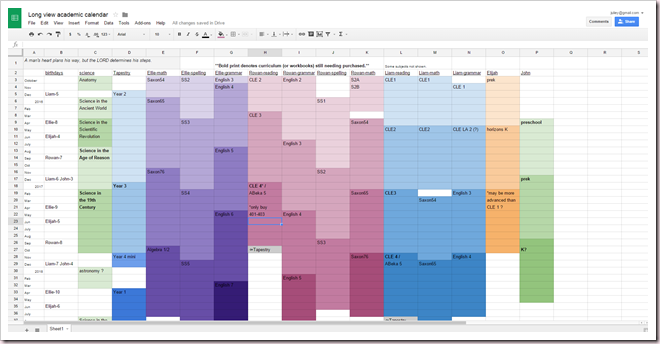There is one verse in the Bible that has become very central this year to the way we do homeschool—Ecclesiastes 12:12. Here it is in context (vv. 9-14):
Besides being wise, the Preacher also taught the people knowledge, weighing and studying and arranging many proverbs with great care. The Preacher sought to find words of delight, and uprightly he wrote words of truth. The words of the wise are like goads, and like nails firmly fixed are the collected sayings; they are given by one Shepherd. My son, beware of anything beyond these. Of making many books there is no end, and much study is a weariness of the flesh. The end of the matter; all has been heard. Fear God and keep his commandments, for this is the whole duty of man. For God will bring every deed into judgment, with every secret thing, whether good or evil.
There are many other verses, of course; Deuteronomy 6:7, for instance, is at the very forefront as well, but Ecclesiastes 12:12 cuts against homeschooling “culture” in general. “School” is not about amassing the most knowledge or meeting lofty academic goals. Nor is it about pursuing our own passions or teaching kids to love learning.
The Words of the Wise
The first thing we’re about, here, is the words of the wise. Solomon says these are the truths given by one Shepherd. This isn’t just random wise words, the wisdom of the ages and the sages, but rather, the wisdom of God Himself. And there’s a promise here, as well—that these sayings are like goads, pushing us to do what we ought, and like nails firmly fixed, of great duration. This is what we should be studying: true wisdom. James 3:17:
…the wisdom from above is first pure, then peaceable, gentle, open to reason, full of mercy and good fruits, impartial and sincere.
Beware of Anything Else
This is huge: if it isn’t wisdom from God, beware. When we study worldly philosophers—Plato, Socrates, the great men of the Renaissance, those in other religious traditions—do we teach them in a positive light, or do we teach beware? The Hebrew here carries the connotation of admonishing, specifically, not just be “wary” but actively caution against them, teach, shine the light on the falseness therein. This is especially relevant when we come to classical education: we must be careful not to lift up these worldly and ultimately inadequate philosophers. It is one thing to know what they teach, but we must not be caught up in it. It isn’t Scripture, it isn’t God’s wisdom, and we must teach it and teach against it. We must remember that even the best philosopher of the world is an enemy of God.
A Weariness of the Flesh
“Much study.” This is a great temptation of mine, both personally and in teaching. I love knowledge. I love reading books and learning new things. I want the children to know all the things, too. But, there’s a very selfish angle there, and I think that’s exactly what Solomon is getting at when he says much study is a weariness of the flesh. It springs from our sinful natures. At a certain point, a certain approach, studying is a fruit of the flesh, not a fruit of the Spirit. At a certain point, studying is not “setting your minds on things above,” but it actually begins to detract from that focus, both temporally (we ought to study “to present yourself to God as one approved, a worker who has no need to be ashamed, rightly handling the word of truth,” 2 Timothy 2:15, not for worldly knowledge) but also in subject matters it can draw us away from God. We have to be careful of what we study, why we study it, and how much time we’re devoting to studying it. We are called to prepare for heaven, not to be philosophers much learned in the worldly arts.
The End of the Matter
“Fear God and keep his commandments, for this is the whole duty of man.” Having affirmed the good and warned against the bad, Solomon offers this final conclusion, and says, this is it. Fear God, and keep His commandments. The end, the book is closed, there’s nothing to say beyond that. This is why we’re here. This is why we homeschool. This is is what we homeschool. This is what we care to have our kids walk away with: fear God, keep His commandments. Everything we do and teach must be tightly focused on those two things.
Of course, Ecclesiastes 12 just led us straight back to Deuteronomy 6 after all:
These words that I command you today shall be on your heart. You shall teach them diligently to your children, and shall talk of them when you sit in your house, and when you walk by the way, and when you lie down, and when you rise…



